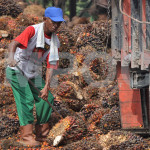Il Fatto Alimentare, AltroConsumo and Coldiretti are Misleading Italian Consumers and Harming Food Security
Italy has become a new frontier for the anti-palm oil campaign in Europe. The opponents of palm oil are now using familiar tactics to frighten consumers against palm oil consumption. Their aim is the same: to limit palm oil’s access to the market, to the advantage of domestic oilseed crops.
At a time when discussion of food security and nutrition are predominant, including at the World Expo in Milan, the Malaysian Palm Oil community is again called to defend palm oil – the most efficient and sustainable oilseed crop in the world – from unjustified new threats.
The anti-palm oil campaign in Italy is led by food campaigning group Il Fatto Alimentare; food promotion organisation Great Italian Food; and Beppe Grillo’s anti-establishment political party Movimento 5 Stelle. With an online petition first and then a resolution in the Italian Parliament, they have been fomenting scare stories and circulating untruths in order to whip up anti-palm oil sentiment. This constitutes irresponsible and unethical lobbying.
Their actions have been accompanied by a strong campaign in the media, supported by Green groups including Greenpeace, consumer association AltroConsumo and farmer’s association Coldiretti. The campaign claims to be about the environment or health, but the truth is simple: it is about protectionism.
Protectionism is why MP Ermete Realacci and some of his colleagues from the Democratic Party – the party of Prime Minister Matteo Renzi – have submitted a resolution to ban non-certified palm oil from the European marketplace. This proposal undermines the trade commitments of Italy and the EU to Malaysia, as well as represents discrimination against palm oil.
Instead of telling consumers the truth, the Italian campaigners have manipulated scientific evidence in their own interest. In the case of a study by Italian researcher Dr Elena Fattore on palm oil and cardiovascular disease, Il Fatto Alimentare completely changed the original findings. Dr Fattore replied with a severe letter opposing the manipulation. It is disgraceful that this NGO would twist the words of a respected scientist and tell untruths to the public. It clearly cannot be trusted.
The Italian public deserves better: they deserve the facts. Palm oil is a healthy, natural GMO-free oil which does not contain dangerous trans fats. The reason why the Italian food industry has increasingly turned to palm oil is to replace partially hydrogenated oils, including sunflower and rapeseed oil.
The process of hydrogenation creates trans fats, which are proven to have negative effects on health. The US Food and Drug Administration is about to announce an almost total ban on trans fats in food. The attempt to limit palm oil use in Italy could harm the health profile of many products, if it leads to more trans fats being consumed.
As demonstrated by many scientists and experts in Europe, palm oil is safe and should not be feared. A recent study by the Mario Negri Institute for Pharmacological Research in Milan explained that palm oil does not increase levels of good or bad cholesterol, but has a neutral impact on cardiovascular health similar to olive oil.
Strong environmental record
A few weeks ago, MP Chiara Ghigliardi from Movimento 5 Stelle submitted a motion to ban palm oil from public institutions and school canteens. Wild accusations were made, linking oil palm cultivation to deforestation. These accusations, which have been rejected by the parliamentary assembly, are manifestly wrong.
Palm oil is the most land-efficient oil crop in the world. When compared to other vegetable oils, palm oil consumes less energy in production, uses fewer fertilisers and produces more oil per hectare. So, the efforts to remove palm oil from the Italian market will lead to more land being used for other oilseed crops and to rising prices for consumers.
The truth is that Il Fatto Alimentare, Altro Consumo and Coldiretti are not interested in consumers. They only care about protecting their own interests and perpetuating their prejudices.
Malaysia has a strong record in environmental protection and species preservation. Those who suggest otherwise are wrong. Malaysia has committed internationally to protect 50% of its land under forest cover and is currently at 62% – almost double that of Italy.
Malaysia also provides a unique example of how socio-economic development can be achieved alongside strict rules on environmental protection. This record has been celebrated by the United Nations and the World Bank, among others.
The campaigners’ attitude is not only dishonourable for the lack of scientific evidence and nonsense of their arguments, but costly for thousands of Malaysian small farmers and rural communities. Some 40% of Malaysia’s palm oil is produced by small farmers, who depend on this activity for their livelihood and to continue on their path away from poverty toward prosperity. They are the victims of Italy’s anti-palm oil campaign.
The Italian Government should firmly condemn the campaign, which also hurts Italy’s own interests and the many reforms that the Prime Minister is undertaking to increase jobs and growth. According to a recent study, the contribution of palm oil to Italy’s economy is more than substantial: €1.06 billion to the GDP, €29 million in tax revenues and 14,600 jobs.
On our side, we will continue to fight for the truth and to defend the Malaysian palm oil community. The facts are on our side – on health, on the environment and on economics. The Italian Government needs to stand on the side of the facts, and not on the fiction created by Realacci and his friends.










Leave a Reply